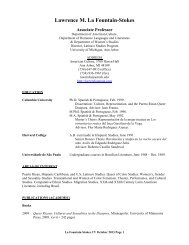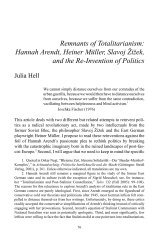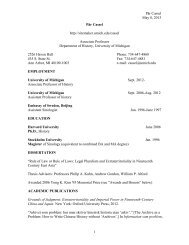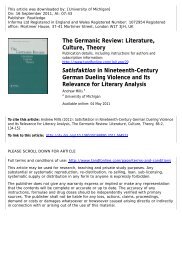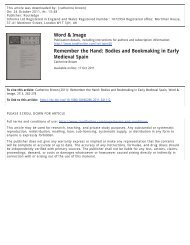Making History Personal: Constantine Cavafy and the Rise of Rome
Making History Personal: Constantine Cavafy and the Rise of Rome
Making History Personal: Constantine Cavafy and the Rise of Rome
You also want an ePaper? Increase the reach of your titles
YUMPU automatically turns print PDFs into web optimized ePapers that Google loves.
Frier, “<strong>Making</strong> <strong>History</strong> <strong>Personal</strong>,” page 10<br />
account <strong>Cavafy</strong> may have known only through Bevan), Ptolemy, accompanied by a eunuch <strong>and</strong><br />
three slaves, obtained lodging in a shabby garret. The Seleucid prince Demetrius, long held as a<br />
hostage in <strong>Rome</strong> <strong>and</strong> by consequence deeply cynical about Roman actions, 31 none<strong>the</strong>less pressed<br />
Ptolemy to accept clothing <strong>and</strong> a crown befitting his station; but <strong>the</strong> Egyptian pretender declined.<br />
<strong>Cavafy</strong> preserves <strong>the</strong> broad outlines <strong>of</strong> <strong>the</strong> story, but supplies from Bevan what Diodorus omits:<br />
Ptolemy’s reason for refusing Demetrius’ generosity is tactical, in that he prefers to appear be-<br />
fore “<strong>the</strong> Senate / as an ill-fortuned <strong>and</strong> impoverished man, / that with greater success he might<br />
beg.” 32<br />
Silver tetradrachm <strong>of</strong> Demetrius I Soter<br />
(http://fontes.lstc.edu/~rklein/Documents/seleucids.htm)<br />
Demetrius, in turn, is <strong>the</strong> protagonist in<br />
“Of Demetrius Soter (162-150 B.C.)” (1915), one<br />
<strong>of</strong> <strong>the</strong> deepest <strong>and</strong> most sharply drawn <strong>of</strong> <strong>Cavafy</strong>’s poems on this period. 33<br />
As in <strong>the</strong> elegies dis-<br />
cussed above, this lengthy poem has a “before <strong>and</strong> after” design, but one that is structured quite<br />
differently. Following a one-line introduction undercutting any possible suspense (“His every<br />
expectation turned out wrong!”), <strong>Cavafy</strong> portrays Demetrius in his long years as a hostage at<br />
<strong>Rome</strong>, yearning to return to a Syria that he only vaguely remembers; he hopes to “end <strong>the</strong> shame<br />
that since <strong>the</strong> time <strong>of</strong> <strong>the</strong> Battle / <strong>of</strong> Magnesia had ground his homel<strong>and</strong> down.” But after he<br />
successfully escapes from <strong>Rome</strong> in 162 <strong>and</strong> claims his throne, <strong>the</strong> reality turns out o<strong>the</strong>rwise.<br />
31<br />
E.g., “That <strong>the</strong>y [<strong>the</strong> Hellenistic monarchs] have, at bottom, / become <strong>the</strong> servants <strong>of</strong> <strong>the</strong> Romans, in a way, /<br />
<strong>the</strong> Seleucid knows; <strong>and</strong> that those people give / <strong>and</strong> take away <strong>the</strong>ir thrones / arbitrarily, however <strong>the</strong>y like, he<br />
knows.” <strong>Cavafy</strong>’s direct inspiration for <strong>the</strong>se lines may be Polybius 31.2.7 <strong>and</strong> 10.7.<br />
32<br />
Diodorus, 31.18.1-2; Bevan, Seleucus II (1902) 189, who states that Demetrius was not allowed to “spoil a<br />
calculated stage effect”; see Green, Alex<strong>and</strong>er to Actium (1990) 442: “ostentatious poverty.” Valerius Maximus,<br />
Memorabilia 5.1.1, observes that <strong>the</strong> Senate eventually provided Ptolemy with suitable accommodations; Bevan,<br />
although citing <strong>the</strong> passage, omits this report, as does <strong>Cavafy</strong>. Polybius, 31.10, recounts a separate visit to <strong>Rome</strong> by<br />
Ptolemy VIII in 163.<br />
33<br />
Liddell, <strong>Cavafy</strong> 175: “Demetrius is <strong>the</strong> one heroic figure in an unheroic world, <strong>and</strong> he has an underst<strong>and</strong>ing<br />
that goes beyond his own personal problems to comprehend <strong>the</strong> collapse <strong>of</strong> his world.” Sometime before his death<br />
in 175, Seleucus IV, Demetrius’ fa<strong>the</strong>r, had sent Demetrius as a hostage to <strong>Rome</strong>; Demetrius was <strong>the</strong>n about 10 or<br />
12 years old. On Demetrius’ reign, see Habicht, “Seleucids” 356-362; Ehling, Untersuchungen (2008) 130-153.<br />
While a hostage at <strong>Rome</strong>, Demetrius was only a prince <strong>and</strong> an heir apparent. On <strong>the</strong> poem, see Pinchin, Alex<strong>and</strong>ria<br />
Still (1977) 48-49, observing how “<strong>Cavafy</strong> compresses <strong>the</strong> time dimension.”






